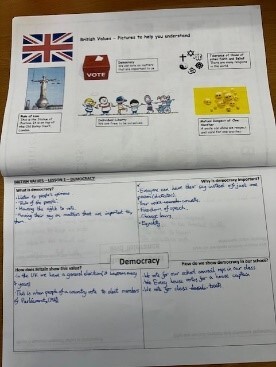The DFE states that there is a need “to create and enforce a clear and vigorous expectation for all schools to promote the fundamental British values of democracy, the rule of law, individual liberty and mutual respect and tolerance of those with different faiths and beliefs.”
The five British Values of mutual respect, individual liberty, democracy, tolerance of those with different faiths and beliefs and rule of law link and tie in with our school values of love, respect, truthfulness and perseverance.
How are British Values Taught at Upton St Leonards?
British values are directly taught as part of our PSHE curriculum in Key Stage 2. Each value is given equal time and explicitly taught and referred back to in future lessons.
Please see more information about how British Values are interwoven through each curriculum area in the Curriculum section of our website.
Children discuss how each value relates to their lives and the impact it has on those around us.

British Values in Worships
British Values form an integral part of our daily worships.
Each day has a focus on a different British Value. These are repeated on a five-day cycle. As well as teaching the children what the five British Values are, their meaning and relevance to the children’s lives are also taught and discussed.
Through teaching in PSHE lessons and through worships, links are made to other subjects such as Geography, Reading, and Religious Education and how living our British Values makes us better citizens.
Building foundations for a love of life, a love of learning and a love of one another